Margaret Thatcher in a British tank during a visit to British forces in Fallingbostel, Germany, September 17, 1986
(AP)
Throughout the 1980s, Thatcher’s government backed Iraq during its war against Iran, funneling weapons and equipment to Saddam Hussein in contravention of both international law and British policy, all the way up until Saddam’s invasion of Kuwait. She even sent Christmas cards to both Saddam and Libyan leader Muammar Qaddafi in 1981.
During her first trip to Israel in 1965, less than two decades after the Nakba and while Palestinians still lived under martial law, Thatcher spoke highly of Israelis for “their sense of purpose and complete dedication, their pioneer spirit, and their realism.” She later advocated that Palestinian self-determination be realized within the context of “some kind of federation with Jordan,” which she deemed “the best and most acceptable solution.”
In 1986, Thatcher said of Golda Meir, who not only denied the Palestinian right of return but also the existence of Palestinians in general, “I greatly admired her. I greatly admired her as a war leader. I greatly admired her tremendous courage. I greatly admired her as a pioneer. I greatly admired her as a great human being, warm, thoughtful, kind, for all her fellow citizens and for human kind in the world as a whole.”
The Shah of Iran and Margaret Thatcher, 1978
In April 1978, prior to her ascension to Prime Minister, Thatcher visited the Shah of Iran, Mohammad Reza Pahlavi, in Tehran where she praised him as “one of the world’s most far-sighted statesmen, whose experience is unrivaled.”
Despite the popular protests against the Shah occurring across Iran with increasing frequency, Thatcher said of her host, “No other world leader has given his country more dynamic leadership. He is leading Iran through a twentieth century renaissance.” Exactly one month before her visit, street protests in over 55 Iranian cities resulted in the killing of more than 100 civilians, when police opened fire on the crowds.
Upon his overthrow the following February, the Shah expressed his desire to seek asylum in England at his lavish country estate in Surrey. While the British government at the time wounded up secretly helping the Shah make his way from Morocco to the Bahamas, it rejected his request to enter the UK.
Thatcher, who became Prime Minister soon thereafter, respected the decision of her predecessor for political reasons, but was “deeply unhappy” that Britain could not offer sanctuary to Pahlavi, whom she called a “firm and helpful friend.”
Thatcher and Hosni Mubarak, 1981
A longtime supporter of the Egyptian dictatorship of Hosni Mubarak, Thatcher once received a memo from the UK Foreign Office referring to Mubarak as “no intellectual but…always friendly and cheerful,” noting that while “apt to express simplistic views, he has become an experienced and accomplished political operator.” The brief continued, “His affable exterior evidently conceals a degree of ruthlessness since it seems likely that he has conducted some successful political infighting to maintain his position” having “succeeded in ousting or at least surviving all other prominent figures in the government or armed forces.”
“Nevertheless his reputation is free of any taint of corruption or malpractice and he is not thought to have made many enemies,” the memo said of Mubarak, adding that he was “eager to improve relations with the Royal Air Force and to buy British [military] equipment.”
Thatcher was only too happy to oblige.
Over the years of her leadership, Thatcher routinely commended Mubarak for his “courage” and “strength.” In 1985, at a banquet in Cairo, she said she “admire[d] particularly, Mr. President, the leadership which you personally…have shown.” Five years later, while hosting Mubarak and his wife at No. 10 Downing Street, Thatcher declared, “You are among our very favourite visitors because we all know you as particularly good and close friends of this country, as we are of Egypt,” and once again
expressed her admiration for the Egyptian president, this time for his “incredible energy.”
“You are as full of beans as ever,” she said. Unfortunately for the Egyptian people over the next 11 years, thanks largely to American and British largesse, she was right.
Thatcher and Chilean dictator Augusto Pinochet
Thatcher was a steadfast defender of Augusto Pinochet, whose unspeakably brutal dictatorship of torture and repression terrorized Chile from 1973 to 1990. She visited Pinochet in 1999 during his house arrest in England, saying that her country “owed” him ”a great debt” of gratitude for his help during the 1982 Falklands War.
Without any sense of irony, Thatcher added, “I’m also very much aware that it is you who brought democracy to Chile.”
Never one to mention his appalling human rights record, Thatcher expressedher “outrage at the callous and unjust treatment” of Pinochet during a speech that October at the Conservative Party Conference, called him “this country’s only political prisoner,” and hailed him as Britain’s “staunch, true friend in our time of need” and “who stopped the communists taking Chile.”
The next year, upon his release and return to Chile, for which she fought tirelessly, Thatcher sent Pinochet a silver Armada dish as a gift, condemned his detention in England as “a great injustice” and wished the deposed dictator and his family “all good wishes for a peaceful and secure future.”
When Pinochet died six years later, Thatcher said she was “deeply saddened” by his passing.
Subsequently, Robin Harris, a former official in Thatcher’s administration, wrote in The Telegraph that Thatcher “took a positive view of Pinochet’s 17 years in power” and “would not have spoken up for him if she had believed him a monster. She could not judge the merits of every allegation. But, clearly, the legal case against him was weak and the motivation of those involved suspect.”
Harris similarly praised Pinochet for “[leaving] behind a stable democracy,” concluding that “Margaret Thatcher has nothing to be ashamed of in defending Augusto Pinochet, when others refused to do so” and that Pinochet “was lucky to find such a champion.”
King Fahd of Saudi Arabia and Thatcher, March 25, 1987
(Corbis)
The Al Yamamah arms deal, signed a year and a half earlier, was “the biggest export transaction in British history, estimated by a British Aerospace executive in 2005 to be worth £83 billion in past and future sales to Saudi Arabia of military hardware including aircraft ranging from Tornado fighters and Hawk trainer jets to Eurofighter Typhoons,” in addition to a wide range of arms, naval vessels, radar, spare parts, and a pilot-training program.
The deal was largely the result of Thatcher’s own lobbying initiative on behalf of the British defense industry and weapons manufacturers and, ever since its signing, allegations of corruption, fraud and bribery have abounded.
Beyond this, Thatcher described the kingdom as “a peace loving nation” and a “modern miracle,” touting its “domestic achievements” and the “stable framework” and “solid rock of a well established and respected monarchy.”
“We are strong partners in trade and defence. We share great strategic interests,” she said.
Regarding Saudi Arabia’s human rights record, Thatcher was silent. “I have no intention of meddling in that country’s internal affairs,” she insisted. “It is one of my firmest beliefs that although there are certain basic standards and goals we should expect from every member of the international community, the precise pace and approach must reflect different societies’ cultural, social, economic and historical backgrounds. And Saudi Arabia, in particular, is a complex society which Westerners do not often fully comprehend.”
Again, without even the slightest hint of irony, Thatcher – in the very same speech – noted, “It is the surest signal to other dictators that the West lacks the resolve to defend justice. We have yet to see its full consequences — our lack of effective action will return to haunt us.” She was talking about Bosnia.
P.W. Botha and Thatcher, 1984
While Thatcher maintained throughout her political career that she “loathe[d] apartheid and everything connected with it,” she referred to Nelson Mandela and the African National Congress, as “a typical terrorist organization” and refused, alongside Ronald Reagan, to back sanctions against the Apartheid regime in South Africa. ”In my view, isolation will lead only to an increasingly negative and intransigent attitude in the part of white South African,” she said in December 1977.
In 1984, Thatcher invited South African Prime Minister P.W. Botha to visit London, the first such visit in 23 years, sparking understandable outrage in the anti-Apartheid movement. The next year, theAssociated Press reported that she “rejected demands by the opposition Labor Party that she meet with Oliver Tambo, leader of the African National Congress guerrilla movement, who is visiting Britain…on grounds he espouses violence.”
“I do not accept that apartheid is the root of violence… nor do most other people,” Thatcher insisted and, during a speech before Parliament, stated that Botha’s “South African government has taken more steps to start dismantling apartheid than any of their predecessors.”
“I can see little point in sanctions creating more unemployment in this country only to create more unemployment in South Africa…It seems to me a ridiculous policy that would not work,” she added.
Five years later, during the last gasps of Apartheid, Thatcher was still opposing sanctions. In 2006, Tory leader (and now British Prime Minister) David Cameron apologized for Thatcher’s actions.
In response to her death, Oliver Tambo’s son Dali told the press, “My gut reaction now is what it was at the time when she said my father was the leader of a terrorist organisation. I don’t think she ever got it that every day she opposed sanctions, more people were dying, and that the best thing for the assets she wanted to protect was democracy,” adding, “It’s a shame that we could never call her one of the champions of the liberation struggle. Normally we say that when one of us goes, the ANC ancestors will meet them at the pearly gates and give them a standing ovation. I think it’s quite likely that when Margaret Thatcher reaches the pearly gates, the ANC will boycott the occasion.”
Thatcher and Zia, 1981
After deposing Pakistani Prime Minister Zulfikar Ali Bhutto in 1977 and imposing martial law, General Muhammad Zia-ul-Haq retained power in Pakistan for a decade. Supported by the United Kingdom, United States and Saudi Arabia, as well as cultivating ties with both Israel and India, Zia-ul-Haq served as an anti-Communist bulwark against Soviet expansion after the occupation of Afghanistan, he presided over Pakistan’s acquisition of nuclear weapons and promoted the spread of Islamist militancy.
During a visit to Pakistan in 1981, Thatcher hailed the dictator’s “courage and skill” and said she and other Western states “admire and support” his commitment to affirm “the right of the Afghan people to choose their own form of government in peace.” Clearly, since Pakistan wasn’t occupied by Soviets, Thatcher didn’t care much for the Pakistani peoples’ own rights to self-determination.
She pledged that Britain and Pakistan would ”maintain a close and friendly relationship,” with her government “giving Pakistan practical support, and toasted the “health and happiness of His Excellency.”
Thatcher and Suharto, 1985
She told the press, “Trade brings us together and identifies our interests, and I am sure that trade between Indonesia and Britain will increase as a result of the very friendly and warm atmosphere created by my visit here. We are clearly the best of friends and there is no sounder basis on which to construct future collaboration.”
“A Foreign Office speciality was smearing witnesses to the bombing of East Timorese villages by British-supplied Hawk aircraft – until Robin Cook was forced to admit it was true. Almost a billion pounds in export credit guarantees financed the sale of the Hawks, paid for by the British taxpayer while the arms industry reaped the profit,” Pilger adds.
With this kind of record, it is clear that Thatcher’s constantly pledged support for “freedom and democracy” was really a violent, imperial campaign waged for free markets and domination.
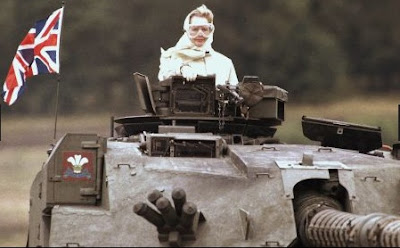
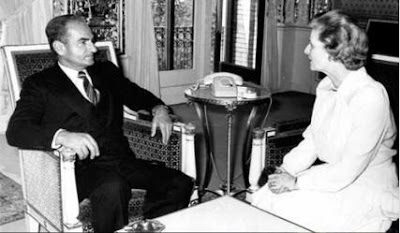
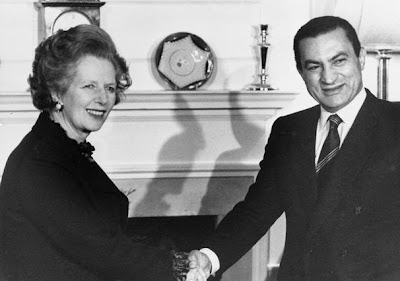
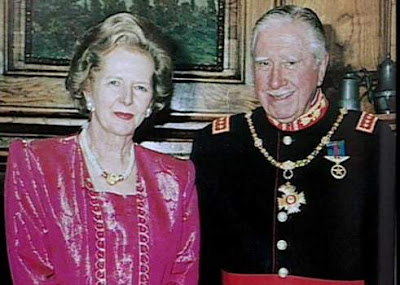
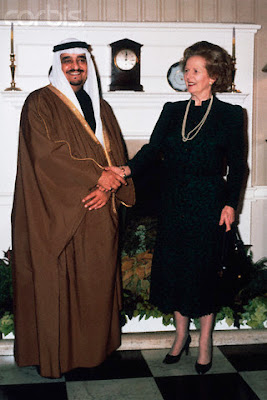
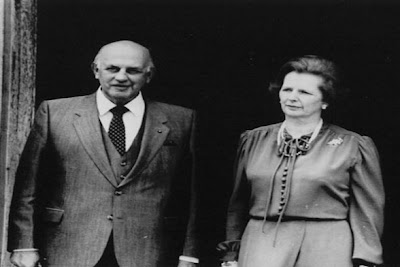

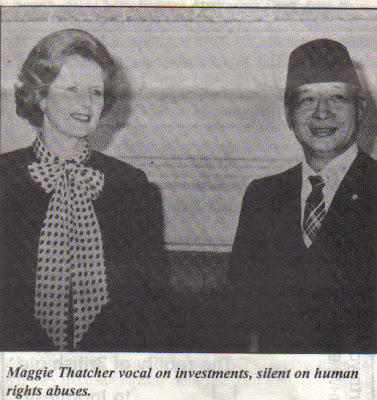

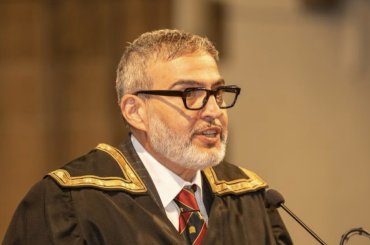
I also found it interesting that her supporters are calling for her critics to be “soft” on their critism of the supposed “Iron Lady”
If I recall correctly , Netanyahu made the same call on behalf of the Egyptian Dictator.
http://www.haaretz.com/print-edition/news/israel-urges-world-to-curb-criticism-of-egypt-s-mubarak-1.340238
Birds of a feather.
The Cold War was going on and she was on the right side. Should we trash Jimmy Carter too, as he said pretty much the same kind of things about the same kinds of people?
….it is clear that Thatcher’s constantly pledged support for “freedom and democracy” was really a violent, imperial campaign waged for free markets and domination.
To be fair to Thatcher, she was an equal opportunities monster, more than happy to also wage the war against her own people at home.
May she rot in the lowest foulest pit of hell.
“Tramp the Dirt Down”
By George Galloway MP
April 09, 2013 “Information Clearing House” – The old saw that one shouldn’t speak ill of the recently dead cannot possibly apply to controversial figures in public life. It certainly didn’t apply to President Hugo Chavez who predeceased Margaret Thatcher amidst a blizzard of abuse.
The main reason it must not preclude entering the lists amidst a wave of hagiographic sycophantic tosh of the kind that has engulfed Britain these last hours is that otherwise the hagiographers will have the field to themselves.
Every controversial divisive deadly thing that Thatcher did will be placed in soft focus, bathed in a rose-coloured light, and provide a first draft of history that will be, simply, wrong.
As is now well-known, I refused to do that today on the demise of a wicked woman who tore apart what remained good about my country, and set an agenda which has been followed, more or less, by all of her successors. I certainly wasn’t prepared to leave the obituaries to those who profited from her rule or those who have aped her ever since.
So here is my own memory of Thatcher and what she did in her time on this earth.
On one of my first political demonstrations – against the Conservative government of Edward Heath (1970-74) the slogan of the day was “Margaret Thatcher- Milk snatcher”. It was the first but not the last time I spat out her name in distaste.
Before Thatcher, every primary school pupil received 1/3 of a pint of milk every morning. For some it was the difference between breakfast and no breakfast. I was sometimes one of those. I grew up in a brief period of social democracy in Britain, being dosed by the state with free cod-liver oil, orange juice and malt to build up my strength. Having been born in a slum tenement into a one-room attic in an Irish immigrant area, I needed all of that and more. And like millions I got it, until Thatcher took it away.
She became the Conservative leader after Heath’s two electoral defeats in 1974 and his subsequent resignation.
She was a new type of Tory leader, entirely lacking in anything resembling “noblesse oblige”. She was nasty, brutish and short of the class previously thought obligatory in Britain amongst leaders of the ruling elite. She was vulgar, money-worshipping, and blasphemous. She believed the important part of the Biblical story of the “Good Samaritan” was not that he refused to pass by the suffering on the other side of the road but that he had “loadsamoney”.
In the infamous sermon on the Mound in Edinburgh addressing the Church of Scotland she opined that there was “no such thing as society”…”only individuals”
As the Labour leader Neil Kinnock, in one of his better efforts, retorted: “No such thing as society? Only individuals? No such thing as honouring other people’s parents? No such thing as cherishing other people’s children? No such thing as us and always? Just ME and NOW? ME and NOW?”
She was the living embodiment of Marx’s prediction that under capitalism “all that is solid will melt into air… all that is sacred will be profaned”
Upon her election as prime minister (with just 40% of the vote, her position ensured by the treacherous defection from the Labour cause of the rats now squirming on the Liberal-Democrat ship) she set about “transforming” Britain allright. She privatised Britain’s key industries, enriching her friends, and robbing the public of their birthright. When she took over “Financial Services” represented 3% of the British economy; when she left office it was 40%.
She destroyed the coal industry, the steel, car, bus and motor-cycle manufacturing, truck and bus-making, ship-building and print-industry, the railway workshops… she destroyed more than a third of Britain’s manufacturing capacity, significantly more than Hitler’s Luftwaffe ever achieved.
She did this not just because she prefered the spivs and gamblers in the city -they were her kind of people. But because above all, she hated trades unionism, and was determined to destroy it.
I was a leading member of the Scottish Labour Party at the time she came into office, and a full-time Labour organiser. Scotland was to become an industrial wasteland in the first years of her rule.
I was also, from 1973, a member of the then Transport and General Workers Union, one of her key targets – especially our Docks section.
Importantly, for me, I was an honorary member of the National Union of Mineworkers too.
In all of these capacities I was a front-line short-sword fighter in the rearguard action against Thatcherism.
I fought her at Bathgate, at Linwood, when she was sacking the automotive industry. I fought her at Wapping – every Saturday night when she destroyed the Print workers on behalf of her friend, the organised crime firm owner, Rupert Murdoch. I fought every day of the Miners strike when she destroyed the Miners Union and the communities they represented. I fought her at Timex in Dundee at Massey Ferguson in Kilmarnock, and at the aluminium smelter in Invergordon.
I fought against her poll tax – imposed first in Scotland – as a refusenik of the most iniquitous tax in Britain since mediaeval times, the tax which ended in flames – literally – whilst I was on the platform at Trafalgar Square. And which finally produced her political demise.
And I toured – as a political activist – the desolation in Britain’s post-industrial distressed areas which she left behind. The City of London – deregulated by her – boomed whilst the coalfields and steel areas sank into penury. I saw the rusted factories the flooded mines the idle shipyards and the devilish results of millions of newly and enforced idle hands.
I faced her in parliament from 1987 as well, on these and other issues.
You see it wasn’t just Britain that Thatcher made bleed.
Her withdrawal of political status from Irish republican prisoners and her brutal, securocratic, militarisation of the situation in the north led to much additional suffering in Ireland.
State collusion in the murder of Catholics became endemic during her rule. And ten young men were starved to death for the restoration of political status, before our eyes in her dungeons. She finally died on the anniversary of their leader, Bobby Sands, being elected to parliament as he lay on his death-bed.
During the Falklands War, she sent hundreds of young Argentinian conscripts to a watery grave when she shot the Argentine warship the Belgrano in the back – as it was speeding away from the conflict. She mercilessly exploited the sacrifice of them, and our own soldiers sailors and airmen, to save her own political skin. A lot of brave men had to leave their guts on Goose Green to keep Thatcher in power.
She pushed her alter ego – the semi-imbecilic US president Ronald Reagan – into Cold War fanaticism and burgeoning expenditure on more and more terrifying weapons – many of them stationed on our soil.
She pushed his successor George Bush Sen into the first Iraq War.
I was there, I saw her lips move, when she described Nelson Mandela as a “common terrorist”.
She continued to recognise the genocidal and deposed Pol Pot regime in Cambodia – insisting that Pol Pot was the real and recognised leader of the Cambodians, even as they counted his victims in millions.
And she was the author of the policy of military, political, diplomatic and media support of the Afghan obscurantists who became the Taliban and Al Qaeda. She even produced them on the platform of the Tory Party conference, hailing them as “freedom-fighters”.
I was one of the last men standing in parliament opposing this immoral policy of “my enemy’s enemy is my friend”.
On the eve of the triumph of these “freedom Fighters” I told Thatcher to her face; “You have opened the gates for the barbarians….and a long dark night will now descend upon the people of Afghanistan”. I never said a truer word.
I hated Margaret Thatcher for what seems like all my life. I hated her more than I hated anyone – until the mass murderer Tony Blair came along.
It would have been utter hypocrisy for me to have remained silent about her crimes today whilst the political class – including New Labour – poured honeyed words, lies actually, over her blood-spattered record.
I could not do it. I believe I spoke for millions. The wicked witch is dead. Tramp the dirt down.
George Galloway MP
House of Commons
London